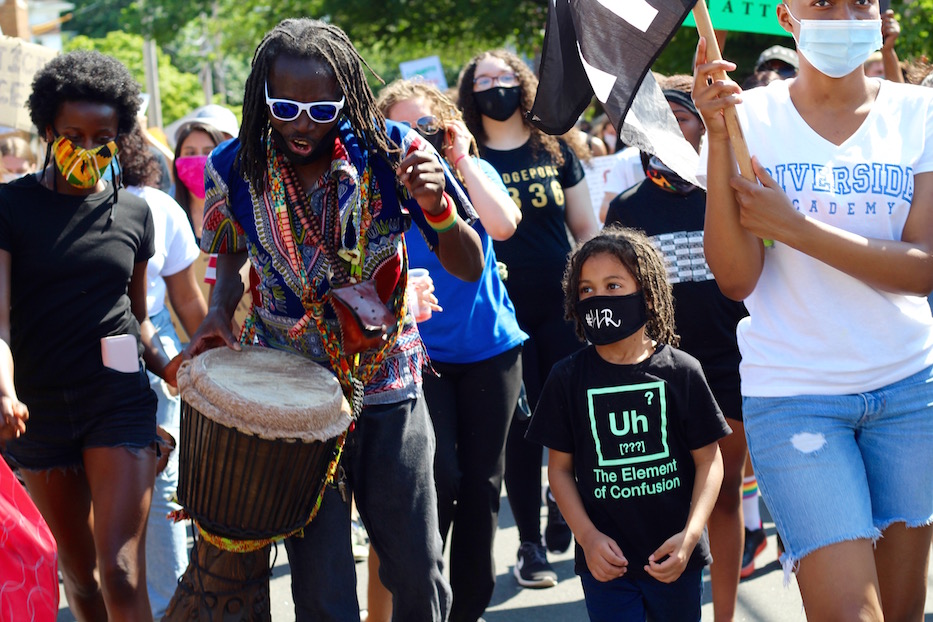
Juneteenth | Arts & Culture | Black Lives Matter | COVID-19
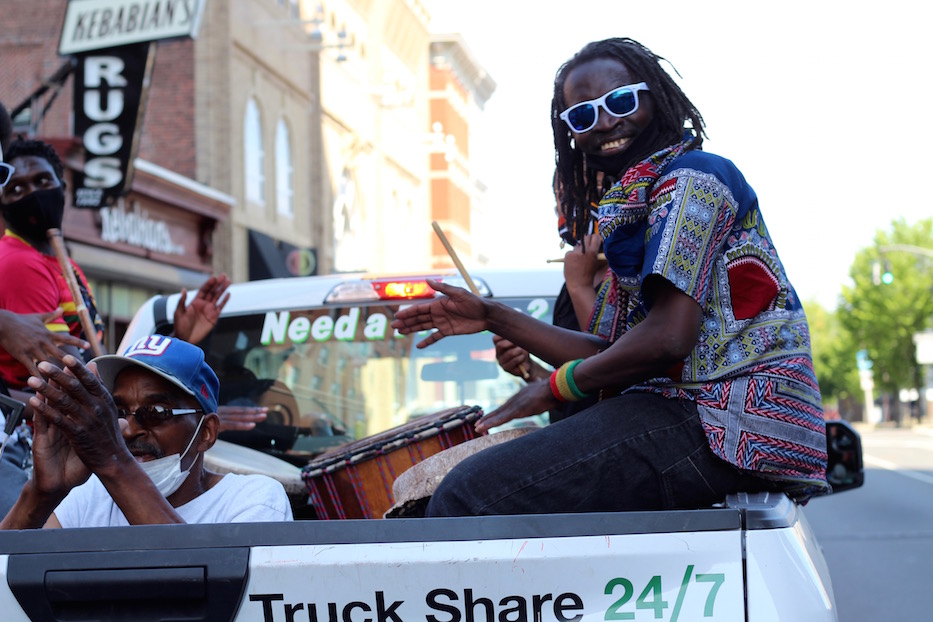
| Aly Tatchöl Camara leads the march. Lucy Gellman Photos. |
The marchers could hear the drums before they saw them. The sound moved closer, a steady beat, and a few people near the front started dancing. White smoke rose into the air from a bundle of sage. The drummers, playing from the back of a U-Haul, rounded the corner onto Elm Street. A cheer went up from the crowd; the march could officially begin.
Well over 500 New Haveners gathered Friday afternoon for a march, celebration, and teach-in to honor Juneteenth, the holiday that commemorates the emancipation of enslaved Black people in Galveston, Tex. on June 19, 1865.
The date, which fell two and a half years after the Emancipation Proclamation was signed, marked the end of chattel slavery in the United States. It did not mark the end of the economic enslavement of Black Americans, which still continues today.
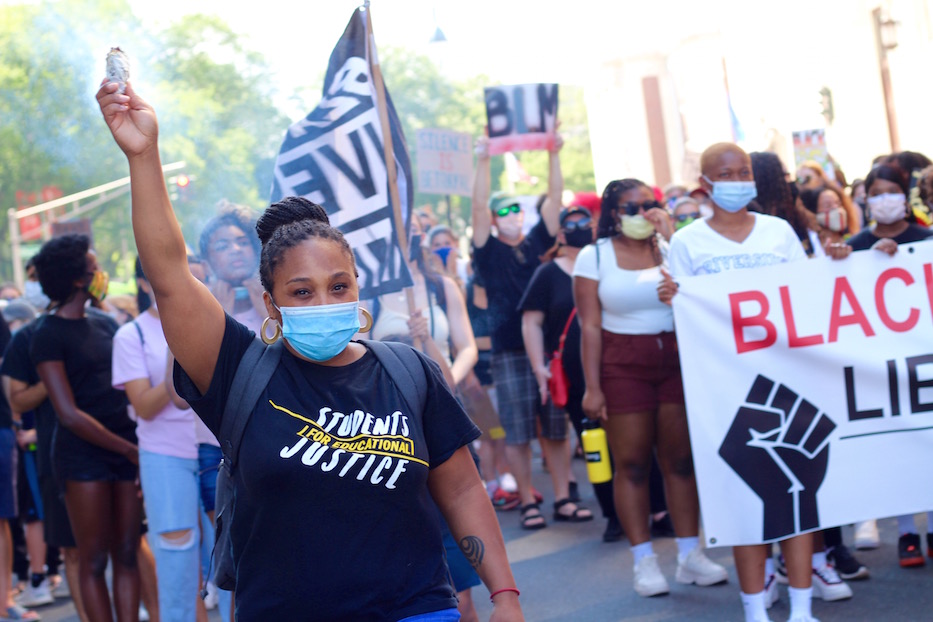
Rashanda McCollum, executive director of Students for Educational Justice.
The event, which travelled from the New Haven Green to East Rock Park, was organized by Citywide Youth Coalition, Students for Educational Justice, and People Against Police Brutality. After starting with a drum circle on the Green, both youth activists and adult mentors centered the importance of collective liberation rather than collective trauma.
For the group, which grew from just dozens at 3 p.m. to hundreds by the time it hit Orange Street, that meant drumming, dancing, and praising Black love in a half-sung, half-spoken cacophony of voices.
“For me, it’s really celebratory, and it really embodies all the work that we’ve done,” said Briyana Mondesir, deputy director for Students for Educational Justice. “We’re fighting to transform unjust systems, and it can be disheartening to continue to fight for that stuff, and not be getting to the places you want. This is very joyful.”
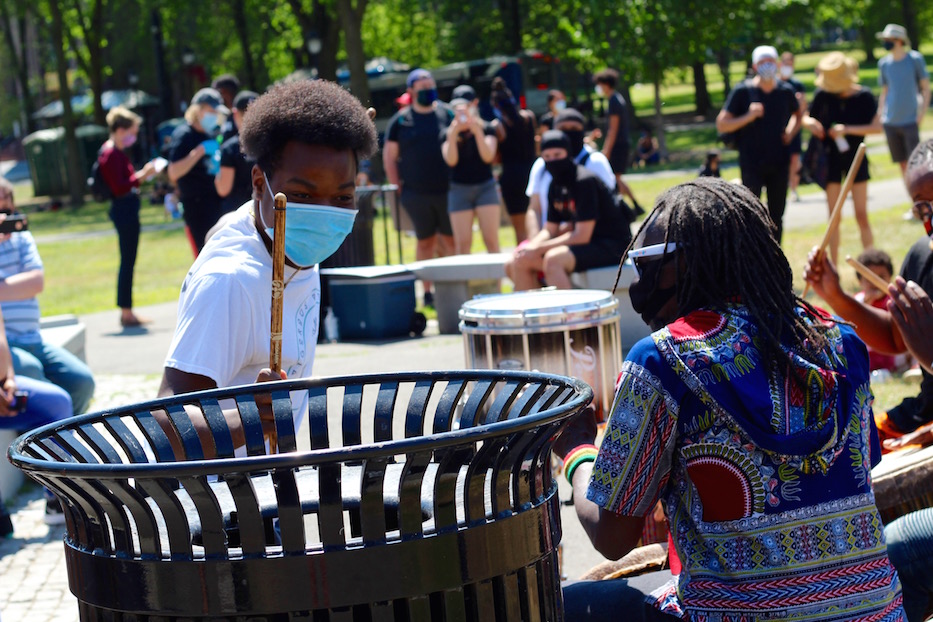
Behind her, Aly Tatchöl Camara struck up a rhythm, hands flying beneath his mask. Camara is the founder of Kouffin Kanecke Company, a New Haven based group that teaches West African dance and drumming in the city. As he played, he connected listeners to a history largely wiped from their history books, grinning and lifting his arms above his head as dancers burst into motion.
Around him, fellow drummers joined in with a rhythm that demanded bent knees and fast, whooshing footfalls. Some marchers stepped in to move without abandon; others pulled out their phones and swayed their hips and heads as they recorded. Musician Christian Reid (a.k.a. Chris Vigorous), a student at the University of Hartford, moved from his drum to the rim of a nearby trash can. The crowd cheered in delight.
They were playing in the spirit of the day, suggested Citywide Youth Coalition Executive Director Addys Castillo. Two weeks ago at the same time, she watched members of the group organize, plan, and lead 5,000 people from the Green to New Haven Police Department headquarters on Union Avenue.
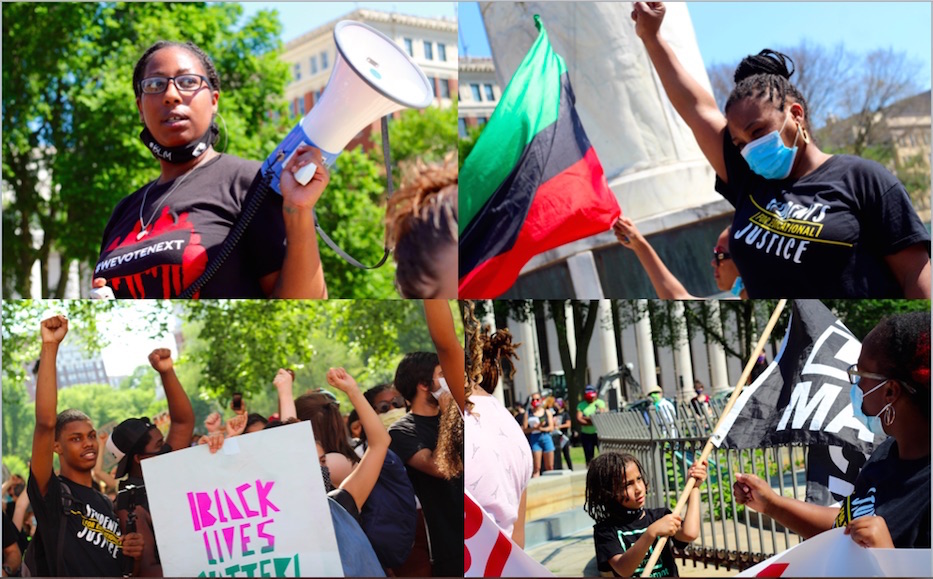
“Now that we have people’s attention and people understand what this is, we need to do the next best thing, and that is to teach people the platform,” she said. “So why not get together? The greatest protest we can have to white supremacy is to live out loud, to live unapologetically. To have joy, to share the drums, to share music, to share our stories with people.”
She added that she welcomes the presence of white and non-Black people of color into the space as well: Citywide is based on anti-racist organizing principles, which believe that collective liberation can’t happen until people both understand and begin to dissect the full breadth and weight of history.
As she spoke, a young kid hopped into the drum circle and started playing with Vigorous. Seny Tatchöl Camara, who is Aly’s son, half-danced as he picked up the rhythm and kept going.
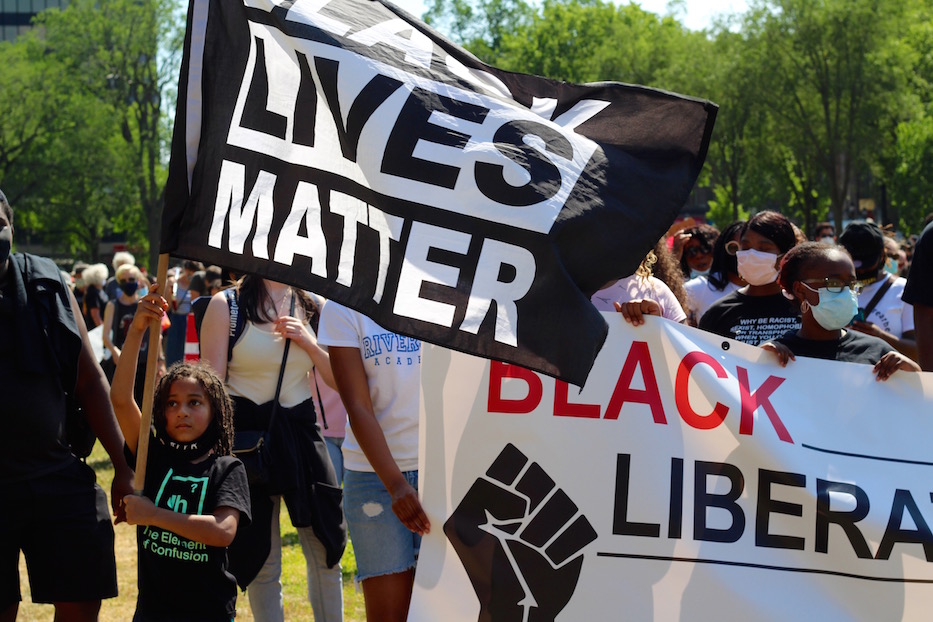
Nearby, Ta’LannaMonique Miller took a red-and-white megaphone and ushered in a moment of silence for the Quinnipiac people, on whose land the march was taking place. Over her head, an American flag and LGBTQ+ Pride flag both flapped at half-mast.
“This is not just a march about Black Lives Matter, this is a celebration of liberation for Black people,” she said. “Today is Juneteenth, our day of liberation. So we gonna walk in that liberation today, right? We gonna march these streets of New Haven in that liberation! We gonna be heard! We gonna take up space. This is our city.”
Around her, marchers cheered as the drummers headed to a flat-bed truck, ready to lead the group. At the edge of the Green, they stood at the ready, eyes searching the street for any sign of Camara. When the pitter-patter of drums drifted over the street—musicians were still trapped behind a 228 bus—the crowd cheered. The line of marchers, now hundreds of bodies, turned onto Elm Street.
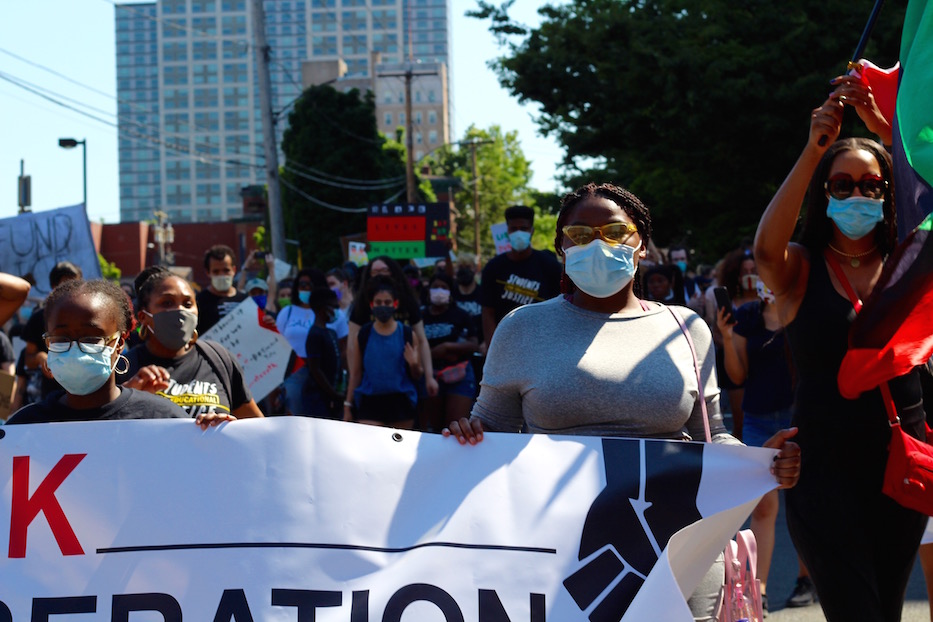
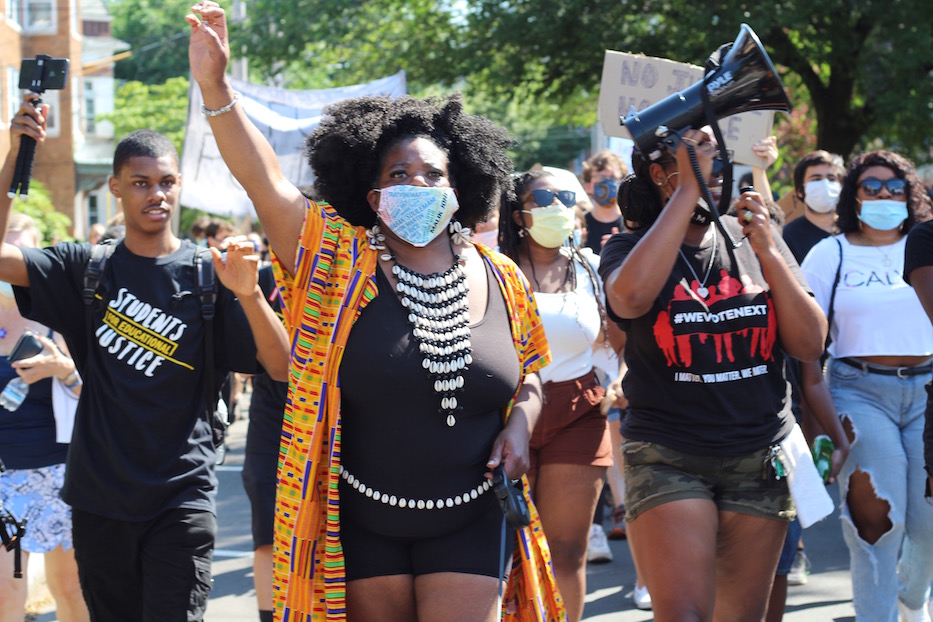
| Top: Mondesir and newly-minted James Hillhouse High School grad Shy'Kita Corbett lead marchers up Orange Street. Bottom: Marcey Lynn Jones. |
As marchers moved from Elm Street onto Orange, they followed the rhythm of the drums, weaving in calls of “Black Love Matters!” and BYP100’s “I Love Being Black.” Hands clapped; hips and shoulders shimmied and shook. At the front of the line, organizer Kerry Ellington switched on and off with youth advocates. By halfway up the street she was gliding, megaphone in hand as sweat collected on her cheeks.
As marches continued up Orange Street, people came onto their porches and front lawns to cheer them on. Some clapped from their balconies and whipped out their phones. At one point, Camara hopped down from the truck and started playing in the crowd. Chants of “No Justice/No Peace!” and “Black Lives Matter!” rose from the back of the line, where some marchers hadn’t gotten the memo on using the people’s mic.

That same sense of liberation set the tone in East Rock Park, where tents filled with food, cold water, Census 2020 information and voter registration forms greeted marchers. Before heading to lessons on police abolition and educational justice, attendees gathered for poetry, music, and storytelling.
Hartford-based poet T’challa Williams turned the afternoon into a call to take up space, a fire-hot mic beaming her voice across the park. Marcey Lynn Jones, an organizer and self-described street minister, led the crowd in a cacophonous rendition of “Lift Every Voice and Sing,” calling it divine intervention as singers got lost in the lyrics and belted out three different verses at the same time.
Amelia Sherwood, who is the dean of social and emotional learning at Elm City Montessori, stepped forward with a copy of Angela Johnson’s All Different Now cradled in her hands. Before she read, she invited marchers to call out names of their ancestors. They rang out one by one: Breonna Tayor. George Floyd. Nat Turner. Marsha P. Johnson. Mubarak Soulemane. Zoe Dowdell.
“You know, we have to keep them with us,” she said. “We have to remember them. Because they’re shining their light right down on us right now. Do you feel them? I feel them. I feel them all around me.”
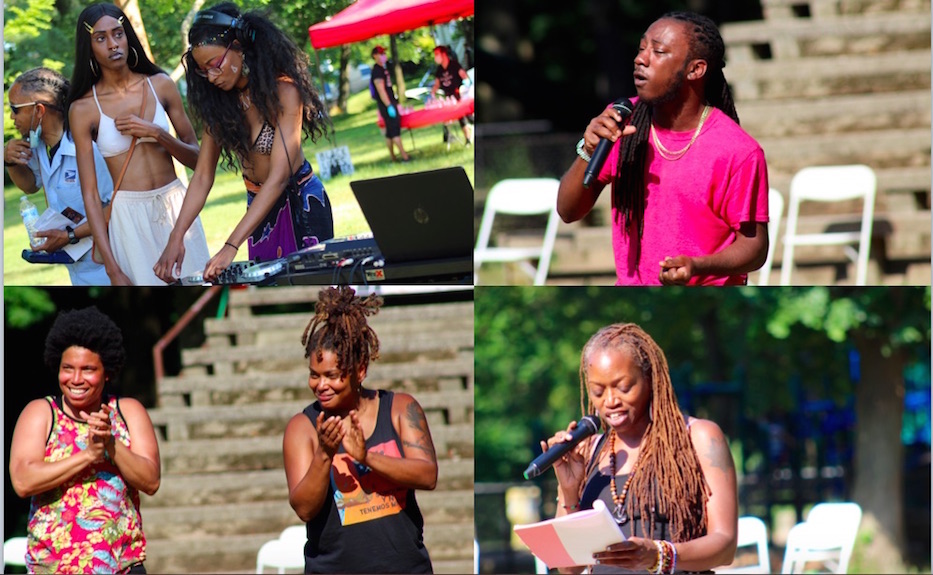
Some speakers also echoed the call for history. Miller, who works with Citywide Youth Coalition, recalled growing up in North Haven, where the schools are predominately white. While she was a student there, she and her peers learned how to read the stock market and fill out job applications. Then she came to New Haven, where the district is primarily Latinx and Black. Students weren’t taught any of that, she said. Nor were they taught their own history.
“We deserve better,” she said. “We will have better. And if you won’t give it to us, we gon’ take it. We gon’ take it. So this is where we build our army. This is where we build our army.”
Ellington, who leads People Against Police Brutality, noted that the date is fitting and cyclical: 155 years after the formal abolishment of slavery, organizers in the city and across the country were fighting for the abolishment of the police.
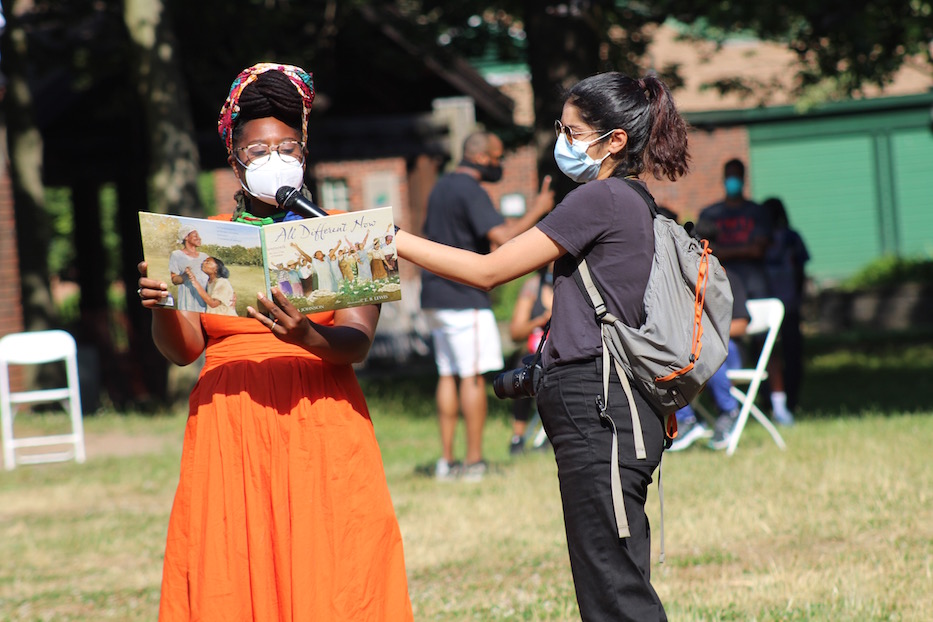
| Sherwood reads to the crowd. |
“Do police keep Black and Brown people safe?” she asked.
“No!” the crowd bellowed back.
“Black people on Indigenous people’s land, we fought for our freedom and we got chattel enslavement abolished,” she said. “So it’s not unique that today, June 19 2020, we’re fighting and having conversations on abolishing the police. Y’all see the connection there? This is a day of legacy and tradition where Black people have fought for liberation and abolishment from systems that harm and violence us. And we’re still continuing that conversation and that fight today.”
For the next two hours, marchers-turned-students split into groups to focus on anti-racism measures that they could take in their own lives, from calling their alders to pushing for a class in the history of race and racism. Under one tent, members of Students For Educational Justice spoke about legislation passed last year, requiring that all Connecticut high schools be ready to offer a course in Black and Latinx history by July 1, 2021.
Since the law’s passing, for which several members of the group testified, Students for Educational Justice has been working to ensure its smooth implementation. They opened the floor to questions about the legislation, race, and racism.
“This is a liberated space,” Miller said. “This is a safe space.’
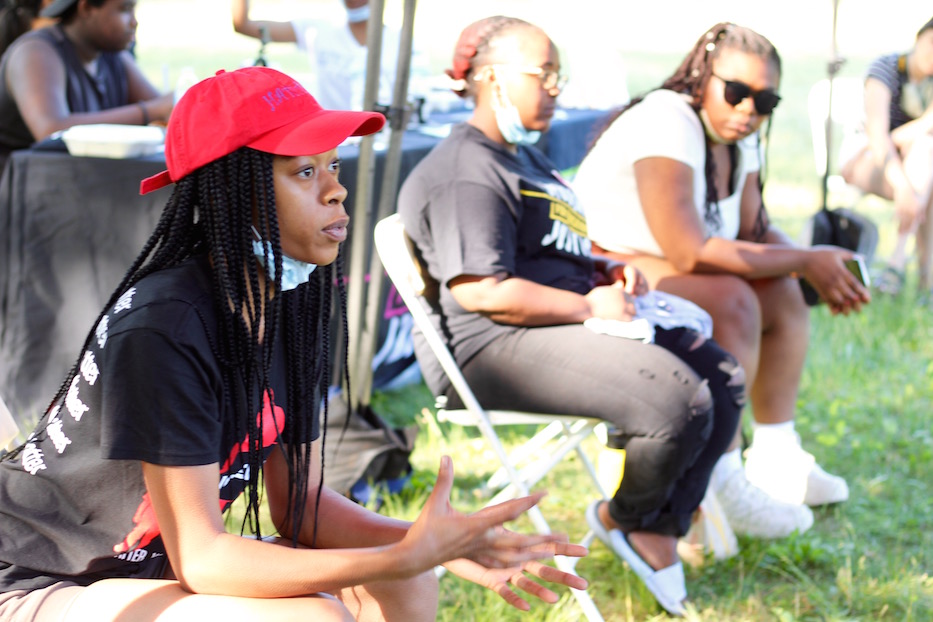
| Simone Davis, a member of Citywide Youth Coalition who just received her MSW from Fordham University. |
Just feet away, Ellington and organizer Vanesa Suarez talked to attendees about abolishing law enforcement in New Haven, starting with armed school resource officers that work in the city's public schools. Suarez, an organizer with the Connecticut Bail Fund, noted that this school year has already been taxing for students, several of whom have struggled with COVID-19 enforced school closures, distance learning, and the digital divide. She echoed calls to replace school resource officers with counselors
“Our youth right now are going through so much,” she said. “And our city is disrespectful of them.”
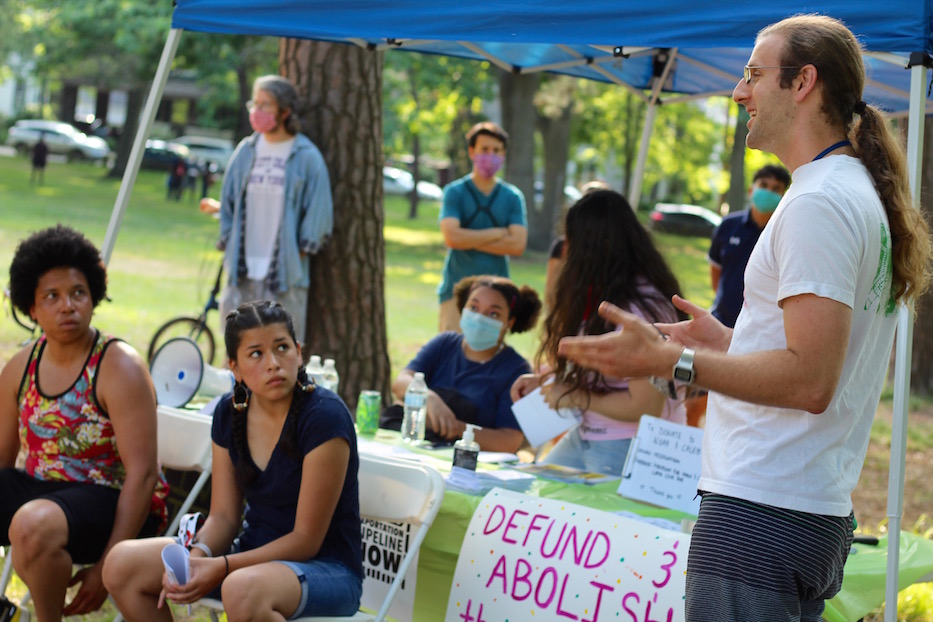
Prospect Hill/Newhallville Alder Steve Winter urged listeners to get involved on the local level, because that’s where the bulk of funding decisions are made. He suggested that it was an opportune time to do so: the current contract with Elm City Local—the New Haven police union—expires in June 2022. Now is the time to make noise, he said.
“You’ve got to be thinking, who is making money?” he said, noting that of the hundreds of people in attendance, only the cops at the perimeter of the teach-in were earning overtime. “Do we really need police each time the city is fixing a utility pole?”
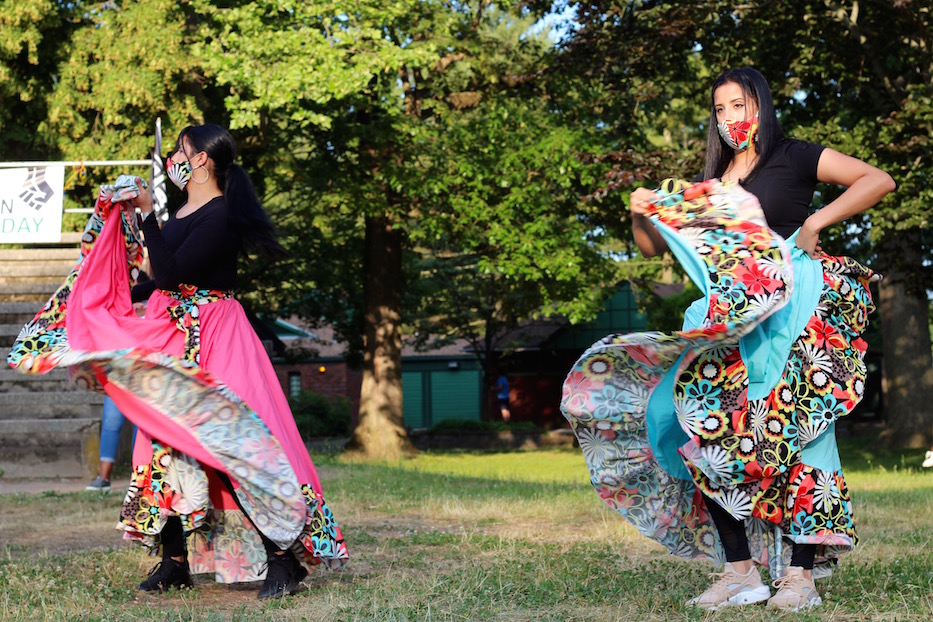
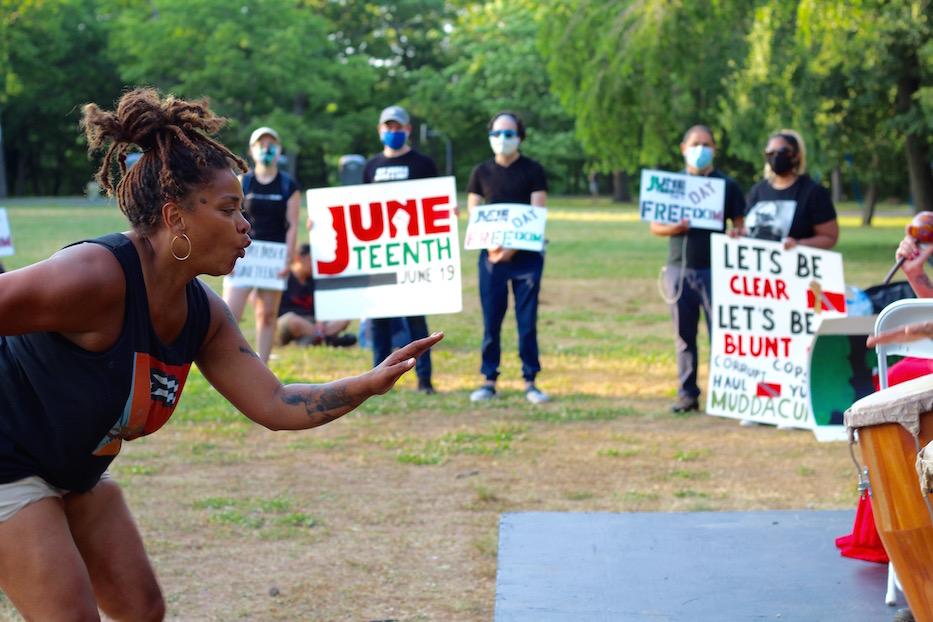
When the crowd gathered again, the first whispers of dusk were setting in. Castillo welcomed Movimiento Cultural Afro-Continental (MCAC) to the stage, to close the night out with the heartbeat-like drum and dance of resistance. She outlined a Batey in the dry grass, giving a history lesson in Bomba before the group began to play.
Jessica Flores’ vocals rose over the crowd as dozens leaned in to listen. From the corner of a makeshift stage, dancers Natasha and Naomy Velez began to move, skirts flying. At the left of the dancers, a few silent protesters from Black and Brown United's partner march filed in and held their signs high. Castillo invited attendees to come in and move to the rhythm, just as the rhythm moved to them.
“We’re all just trying to get free, right?” Castillo said. “We’re all just trying to get free.”
To watch videos from the event, click below or check out the Arts Council's Instagram page.

